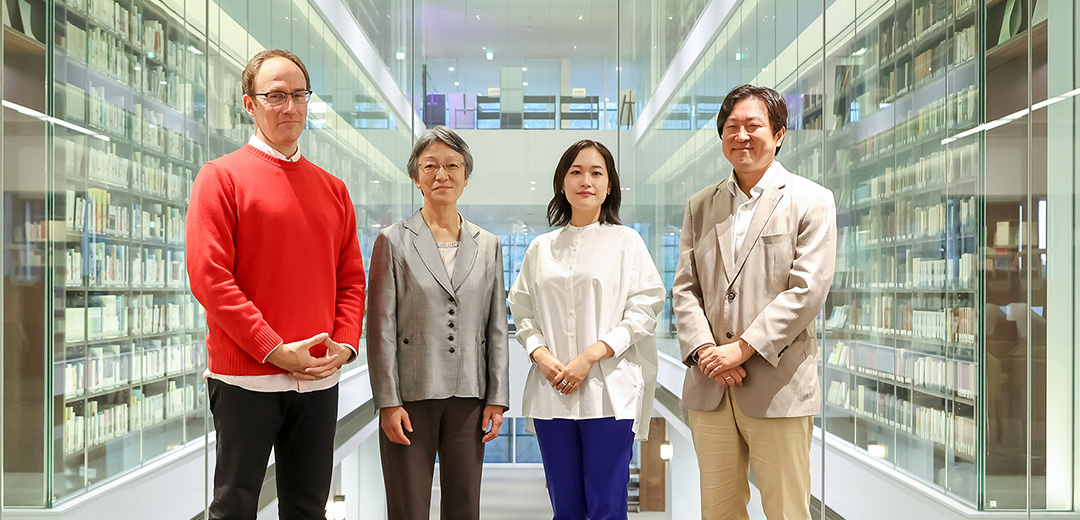
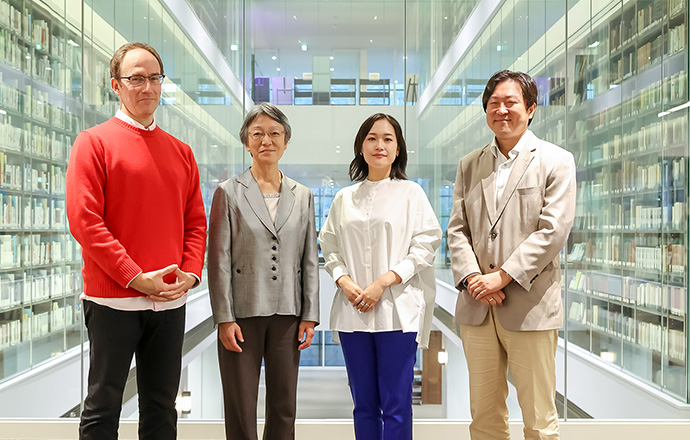
Talk02The Character and Appeal of the Global Studies Major as Viewed from Outside the University
Without leaving Japan, students of many nationalities can absorb many things through peer learning and by inspiring each other.
PROFILE
-
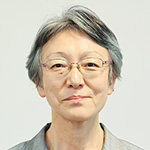
Professor Ritsuko Kawamura (Dean)
PhD, Division of Natural Resource Economics, Graduate School of Agriculture, Kyoto University.
Areas of expertise: Agricultural and food economics, rural development -
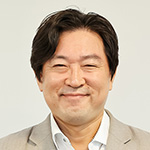
Associate Professor Yuichiro Amekawa
PhD in Rural Sociology and Sustainable Agriculture, Department of Sociology / Graduate Program in Sustainable Agriculture (Joint Degree), Iowa State University
Previous positions: 2011-2012: Senior Lecturer, Gender Studies Programme, Faculty of Arts and Social Sciences, University of Malaya (Malaysia)
2012-2014: Senior Lecturer, Faculty of Science, Institute of Biological Sciences, University of Malaya
2014-2018: Assistant Professor, Graduate School of Agriculture, Kyushu University
April 2018-present: Current position
Areas of expertise: Agricultural and environmental sociology, Southeast Asian area studies (Thailand) -
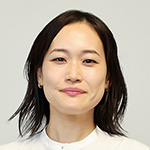
Associate Professor Megumi Ochi
LLM, Faculty of Law, Leiden University (Netherlands) PhD, Graduate School of Law, Osaka University
Previous positions: 2019: Senior Researcher, Hyogo Earthquake 21st Century Research Institute
2019-2020: Assistant Professor, Hakubi Center/Graduate School of Law, Kyoto University
April 2020-present: Current position
Areas of expertise: International law, international criminal justice -

Associate Professor Nathaniel M. Smith
PhD, Graduate School of Anthropology, Yale University
Previous positions: 2011-2013: Japan Foundation Faculty Fellow in the Anthropology of Japan, Department of East Asian Languages and Cultural Studies, University of California, Santa Barbara (USA)
2013-2021: Assistant Professor of East Asian Studies and Anthropology, Department of East Asian Studies, University of Arizona (USA) 2019-2021: Visiting Scholar, Graduate School of Asia Pacific Studies, Waseda University
April 2021-present: Current position
Areas of expertise: Cultural anthropology, nationalism (far right political activism), urban studies, Japan studies
What did the Global Studies Major (GS) look like from outside the university? In this discussion, a group of recently appointed GS faculty members talk with the Dean of the College of International Relations about traditions that should be preserved and future initiatives, all while reflecting on the differences with other educational institutions.
A novel approach where Japanese and international students learn together
What was your first impression of GS?
-

Amekawa I was the coordinator of the G30 Program (*1) in my previous position in the Faculty of Agriculture at Kyushu University, and I did not find out until some time after I arrived that GS was also related to the G30 Program. The reason I didn't realize this right away was that the program at the Faculty of Agriculture at Kyushu University was a small program with between four and seven students, while GS was a much larger program. Coming to GS was the first time I had to teach in a place where Japanese and foreign students were studying together, which was very refreshing.
-

Ochi Each university has its own way of continuing the G30 Program after it concludes, but I think it is rare to find a program like GS that has settled on a long-term plan. I also felt that GS had more international students from Asian countries, especially Southeast Asia and South Asia, than other universities with similar departments. There are also a lot of students who were born and raised overseas even though their parents were Japanese as well as students who were born and raised in Japan but educated in international schools. In addition, I felt that GS had earned the trust of Japanese parents.
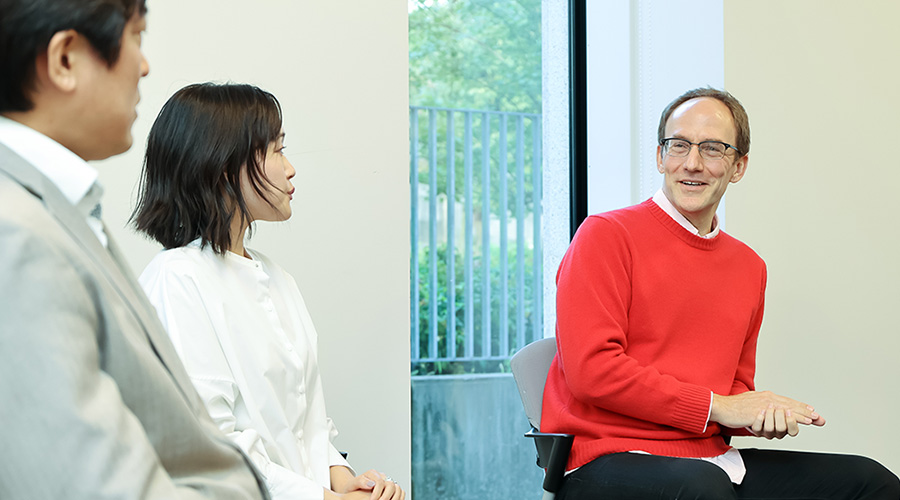
-

Smith I earned my master's degree from the Graduate School of Asia Pacific Studies at Waseda University, so I knew about Ritsumeikan Asia Pacific University, which had opened in Beppu around that time. When I heard the name Ritsumeikan, my impression was more of APU in Beppu. As for the G30 program at Ritsumeikan that was just mentioned, I first heard about that when I was working as an Assistant Professor at the University of Arizona. One of my graduate students was researching international education, and I learned about the program when I was supervising their thesis.
-

Kawamura So, why did everyone apply for GS in the first place?
-

Amekawa My expertise lies in the area between international development and environmental issues, so I was applying for positions in all kinds of programs, including international relations and sociology.
-

Ochi I also applied to everywhere I could.
-

Kawamura I think it’s not good for the College of International Relations to have people who can only teach one thing, like Economics. The college won’t suit you unless you can teach courses from a wider perspective and with more flexibility. This is why people with a multifaceted mindset don’t get hired elsewhere, but fit in perfectly here. (laughs)
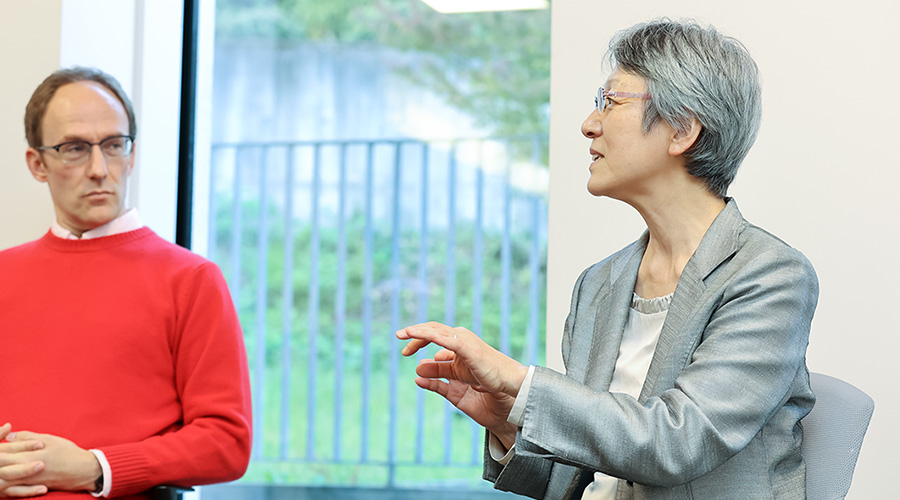
-

Amekawa Indeed. My master’s in global studies at the University of Oregon was an interdisciplinary program, so I took classes in political science, economics, anthropology, and many other fields in addition to my classes on international affairs.
-

Smith I agree with Professor Kawamura, and I think I am someone that has a wide range of interests. As a teacher, I aim to tap into each student's interests and use those to lead them toward some kind of academic discipline. I like education that allows me to handle a wide range of subjects, and I think it suits my personality.
-

Ochi Like both of you just said, I am also involved in many different things. Since I was researching genocide and other international crimes, I wanted to tackle a single issue from multiple perspectives, so I attended conferences held by a variety of associations such as the Japan Association for United Nations Studies, the Criminal Law Society of Japan, and the Japan Association for African Studies.
*1: Global 30 (G30) Program: A program implemented by the Ministry of Education, Culture, Sports, Science and Technology to promote the formation of networks for the internationalization of universities.
A place where Japanese students can grow by studying with international students with different backgrounds
Tell us what you think are the attractive features and good points of GS.
-

Amekawa At my previous school, I only taught international students, and they were all from Asia. Compared to that, GS has a diverse student body with students from places like Europe, North America, Africa, and Latin America. Also, at my previous school, we used to conduct a questionnaire with international students, and they said they were sad that they could not study with Japanese students. They said, since they were in Japan, they wanted to study with Japanese students, but we were not able to provide them with that opportunity at all. At GS, however, international and Japanese students can hear each other's opinions in regular classes. For example, in a class on population theory in which some of my students were from Africa, a Japanese student gave a presentation on the need for more family planning to control the population of Africa. Then, a student from Rwanda in Africa said that was a privilege, or something that could only be accessed if you had money, and that it felt like advanced countries were imposing their will on African countries. When I heard this, I felt that the discussion was becoming quite tense (laughs). I think that if Japanese students have an environment where they can study together with international students, they can really grow. So, if a student who can speak a little bit of English enrolls in GS, compared to enrolling in another international department, I think the things they will have absorbed by the time they graduate will be very different. I don't know how much knowledge they will have acquired, but I think they will have gained a proactive attitude through active learning, the ability to pose and answer their own questions, and many opportunities to do group work. I think this is one of the strengths of GS.
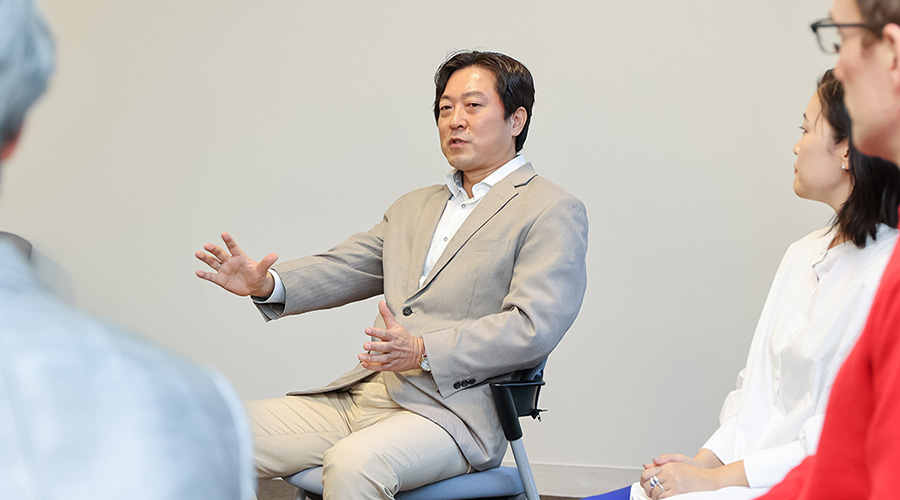
-

Ochi To add to this point, many of the students in GS have parents of different nationalities. Some of these students are not particularly sure where their identity lies, so I feel that these students can take advantage of the fact that they can speak from the perspective of two different countries. This is possible because there is not a strong tendency for GS students to form cliques; they do not rigidly divide themselves by country. GS provides an environment where students can get along and talk regardless of nationality or origin.
-

Smith Indeed. Even Japanese students can be exposed to the English spoken in many different countries.
-

Kawamura Yes, not just standard English.
-

Smith They have to speak an international standard version of English.
-

Kawamura Next, I would like to make one point about seminars. The good thing about GS is that we employ small-group education, so you can have discussions and presentations even in regular classes. In general, most university classes are one-way lecture-style classes, but in the seminars, students create their own research projects by participating in group discussions and other activities. That's why seminars exist as a special type of class, but in the case of GS, every class is like a seminar, so when the program first started, we had to ask ourselves what exactly constitutes a seminar. In fact, until the class that enrolled in AY2017, seminars were not mandatory, so there was a certain number of students who had graduated without ever taking a seminar or without writing a thesis even if they did take a seminar. However, we decided to make seminars mandatory starting with students who enrolled in AY2018 because we believed that the Japanese-style seminar, where you can create your own research project, should also function properly in GS, and that there is meaning in writing a thesis.
We want to produce students with an international perspective and curiosity about the world
In your opinion, what are "global human resources”? What kind of students do you want GS to produce?
-

Smith I want to produce students who, even if they don’t go out into the world, can utilize academic literature and other materials to develop an international perspective. At GS, I think our students can develop a wide range of knowledge in four years, without having to study abroad.
-

Ochi To become global human resources, I think it is important for our students to be able to communicate with people from different cultures, although that is a bit of an oversimplification, and to always be curious. It is important to maintain an attitude of being interested in others, and even if you fail to communicate your ideas in one attempt, it is important not to give up, to sustain your interest in the other party, and dig even deeper. While this attitude is partly an issue of information gathering, I want to produce students who are curious and interested in the world. I am always thinking about how to cultivate this kind of curiosity in my classes.
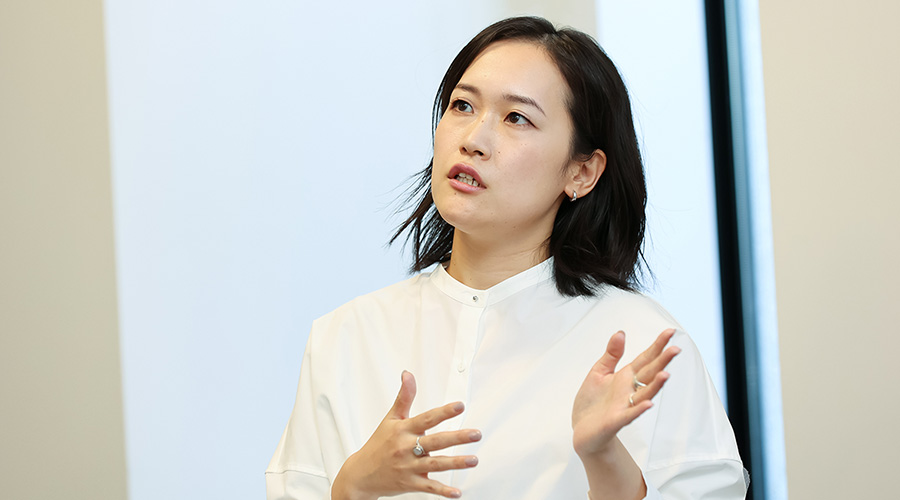
-

Amekawa The kind of students I would like to produce are those who can see others as individuals regardless of their nationality. By the way, my wife is from the Philippines, but when I interact with her, I don't usually think of her as a foreigner. In Japan, when we look at foreign countries or foreigners, we tend to impose various attributes on them through the filter of each country's politics or economy. While this can be important in understanding a group of people, in reality, even within the same country or region, there can be considerable individual differences in terms of personality and ways of thinking. This is common sense, but I hope our students will remember that each and every one of us is a unique human being.
-

Kawamura GS graduates are working all over the world, but not all of them work for foreign companies. Many of our international students advance to graduate school, but many of our Japanese students go on to work for regular Japanese companies. Looking at the College of International Relations as a whole (including the International Relations Major), many students have a big dream to work for an international organization, but that is not a career you can break into with just a bachelor’s degree. Generally, those organizations won’t hire you unless you’ve completed a graduate school program. On the other hand, I know that some of our IR students have gone to work for regular companies, then moved on to international organizations after earning their master’s degrees. I am sure that they were able to rise to the challenge because they were inspired by various people during their undergraduate years, including international students and students who had studied abroad, which imbued them with an international sensibility. If you are a GS student, you will be even more stimulated during your four years of undergraduate education. In GS, many of our students and faculty members, including those of you in this roundtable discussions, are foreign nationals or have diverse backgrounds. At GS, you get to see and hear about the experiences of many different people, and you get to rub shoulders with them. Of course, lectures and seminars are important, but I believe that the stimulation our students receive from all the people in the GS Major will be their greatest source of inspiration.
Flexible styles of education born from the COVID-19 pandemic
What good points of GS do you want to keep and what new initiatives do you want to undertake?
-

Ochi I hope we can keep small-group education and seminars. I took seminars myself when I was a student, and I felt that it was a good experience to have a very warm and at-home space with people outside of your family. Personally, I hope we can preserve the Japanese style of seminars.
-

Smith I've only been here for six months, but what I can tell you is that possibilities have emerged because we were forced to switch to web-based classes due to COVID-19. There were international students who could not enter the country, and students who had returned home for some other reason. While it depends on the subject, what we found is that we can even deliver classes to these students by the internet. In the future, I hope we can use this experience to create a flexible educational environment where all kinds of people can continue to their studies.
-

Ochi I agree. While it was not limited to GS, there were many international students who could not return to Japan because of the pandemic. I feel that the on-demand classes have been very useful as a safety net. Another thing that I would like to see us continue is the meticulous support that the office staff give to our students. GS students have diverse backgrounds, and some of them may not be able to get information properly, or they may react to it in a slightly different way than in Japan. I feel that it is very important for the office staff to take good care of these students by sending them reminder emails. It is wonderful that this know-how is being passed down even though the staff members occasionally change.
-

Amekawa Associate Professor Smith mentioned on-demand classes, but in a similar vein, students in my seminar conducted online interviews with staff from domestic and foreign NPOs and NGOs as part of a project for the Open Seminar Conference (*2). The students learned a lot from this experience, including the fact that you may receive almost no responses after sending a large number of emails so you must express your gratitude to those people who do reply. Based on this experience, some of my students indicated that they wanted to conduct interviews as part of their graduation thesis project. This depends on their topics for the Open Seminar Conference and their graduation thesis projects, so they may not be able to do interviews every year, but online interviews are a convenient tool, and I hope our students can keep using them going forward.
-

Kawamura Something that hasn’t come up in our discussion so far that I would like to consider going forward is how to create more interactions between GS and IR. The Global Simulation Gaming (*3) course that all second-year students must take is a mixture of IR and GS students, and I think the students in both majors should experience more intermingling like this. IR students can take most of the GS classes, and if they put themselves out there in extracurricular activities as well, they can easily make friends with the international students in the GS Major. However, it seems that only a handful of students are doing this, which I think is a little unfortunate. Similarly, I think that GS students, especially international students, will be able to enrich their experience in Japan by increasing their interactions with IR students.
As Professor Amekawa mentioned, more GS seminar students are participating in the Open Seminar Conference, so I think this can become a venue we can use to further promote GS. I believe that the importance of GS for the College of International Relations will increase more than ever, and I hope that the entire college can work together to promote GS.
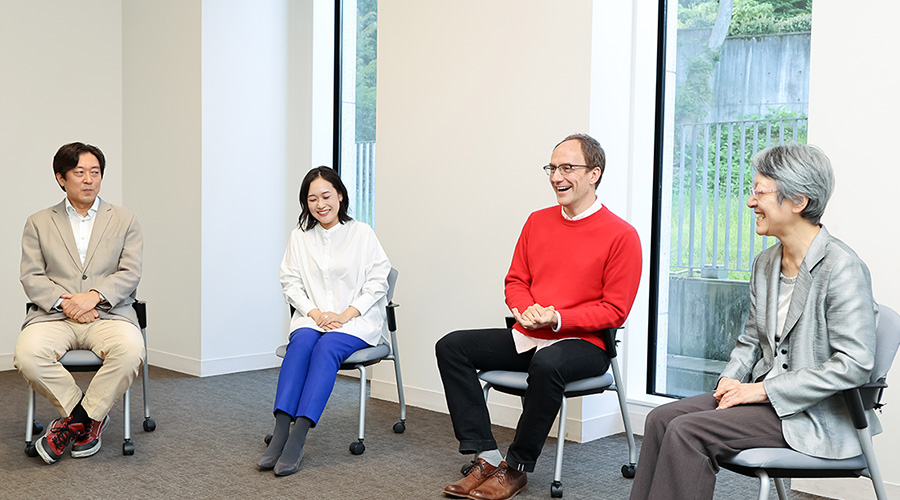
*2: Open Seminar Conference: A poster presentation competition held by the College of International Relations. Here, students who belong to various seminars can present the results of their day-to-day research to audiences both inside and outside the university.
*3 Global Simulation Gaming (GSG): A class in which GS and IR students engage in simulated international negotiations to solve real international problems.

